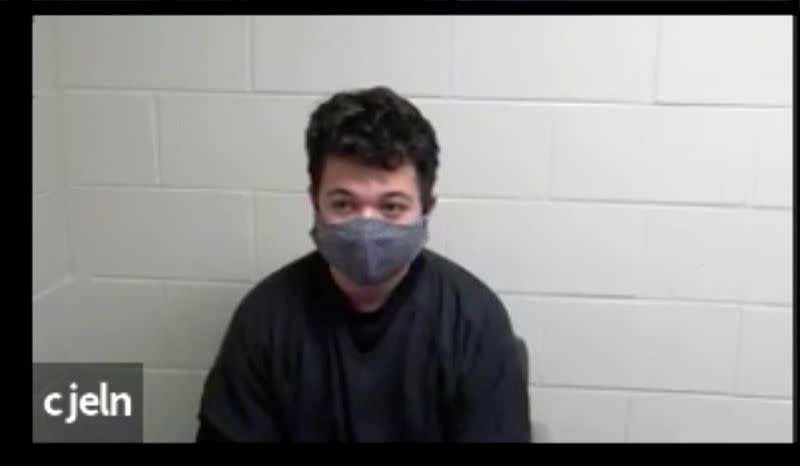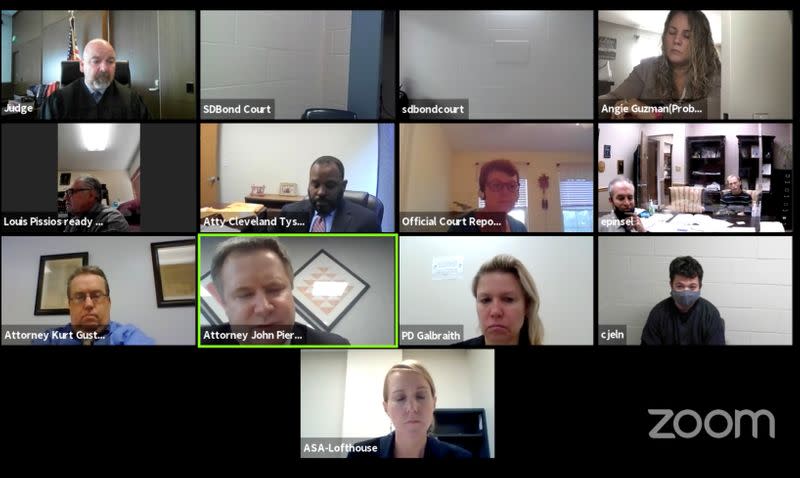Teenager charged with killing two Kenosha protesters fights extradition
By Nathan Layne
(Reuters) - Kyle Rittenhouse, the teenager charged with killing two protesters and injuring another during demonstrations about race and justice in Kenosha, Wisconsin, will fight extradition from Illinois, his lawyer told a court hearing on Friday.
Rittenhouse, 17, has been charged by Kenosha County's district attorney with six criminal counts in connection with the shooting of three people who tried to subdue or disarm him during protests on Aug. 25, two of whom died.
Rittenhouse participated in the hearing at the Lake County Circuit Court in Illinois via video link from the detention facility where he is being held. He was wearing a black sweatshirt and a gray mask covered his face.
"Good morning, your honor," he addressed the judge in his only remarks in the hearing, which lasted just a few minutes.
John Pierce, who has said his client acted in self-defense, indicated he would challenge the legal basis for his detainment in fighting his extradition.
"We intend to challenge extradition by writ of habeas corpus," Pierce told associate judge Paul Novak. "In fact, these are going to be involving issues of some complexity. Frankly, they have not arisen in the country for some time."
Rittenhouse had traveled on Aug. 25 from his home in nearby Antioch, Illinois, in a self-appointed role to protect the streets of Kenosha where the police shooting of Jacob Blake had sparked large protests against police brutality and racism.
The counts against him include first degree intentional homicide in the death of 26-year-old Anthony Huber, a charge that carries a life sentence, and first degree reckless homicide in the death of Joseph Rosenbaum, 36.
He was also charged with attempting to kill a third man, Gaige Grosskreutz, who was shot but survived.
Illinois Governor J.B. Pritzker had a signed a warrant for Rittenhouse's extradition, a prosecutor told the judge.
Mike Nerheim, the Lake County state's attorney, said after the hearing that defendants will often waive extradition, obviating the need for a governor's warrant, but that his office had initiated the process quickly in this case to secure one.
He cited four bases on which Rittenhouse could fight extradition: whether relevant documents are in order, whether he is wanted for a crime in another state, whether he is indeed the person wanted, and whether he is a fugitive of the law.
"In 20 years I haven't seen one where somebody challenges extradition, especially once the governor's warrant's been issued," Nerheim told a news conference.
Rittenhouse's legal team have said that he feared for his life when he fired his semi-automatic rifle. Cellphone videos from the night show chaotic scenes, including one where Rittenhouse is chased and falls down before his encounter with Huber and Grosskreutz.
Huber appeared to hit Rittenhouse in the shoulder with a skateboard and tried to grab his rifle before being shot, according to the criminal complaint. Rittenhouse then pointed the rifle at Grosskreutz, who had a hand gun, and fired.
Rosenbaum appears to have thrown a plastic bag at Rittenhouse before he was shot, according to the complaint.
Rittenhouse's lawyers have also sought to portray the case as a referendum on the right to bear arms following a summer of sometimes violent protests in major U.S. cities.
"A 17-year-old American citizen is being sacrificed by politicians," the narrator says in a video released this week by a group tied to his legal team. "Their end game is to strip away the constitutional right of all citizens to defend our communities."
Judge Novak set the next hearing for Oct. 9.
(Reporting by Nathan Layne in Wilton, Connecticut; Editing by Leslie Adler and Alistair Bell)



